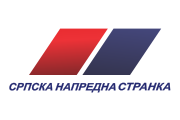
Back الحزب التقدمي الصربي Arabic الحزب التقدمى الصربى ARZ Сербская прагрэсіўная партыя Byelorussian Сэрбская прагрэсіўная партыя BE-X-OLD Сръбска прогресивна партия Bulgarian Partit Progressista Serbi Catalan Srbská pokroková strana Czech Serbische Fortschrittspartei German Σερβικό Προοδευτικό Κόμμα Greek Partido Progresista Serbio Spanish
Serbian Progressive Party Српска напредна странка | |
|---|---|
 | |
| Abbreviation | SNS |
| President | Miloš Vučević |
| Deputy President | Jorgovanka Tabaković |
| Vice-Presidents | |
| Parliamentary leader | Milenko Jovanov |
| Founders | |
| Founded | 8 September 2008 |
| Registered | 10 October 2008 |
| Split from | Serbian Radical Party |
| Headquarters | Palmira Toljatija 5/3, Belgrade |
| Newspaper | SNS Informator |
| Youth wing | Youth Union |
| Women's wing | Women Union |
| Membership (2024) | 700,000–800,000 |
| Ideology | |
| Political position | Big tent |
| European affiliation | European People's Party (associate) |
| International affiliation | International Democracy Union |
| Parliamentary group | Aleksandar Vučić – Serbia Must Not Stop |
| Colours | Blue |
| National Assembly | 105 / 250 |
| Assembly of Vojvodina | 59 / 120 |
| City Assembly of Belgrade | 45 / 110 |
| Party flag | |
 | |
| Website | |
| sns | |
The Serbian Progressive Party (Serbian: Српска напредна странка, romanized: Srpska napredna stranka, abbr. SNS) is a major populist, catch-all political party in Serbia. It has been the ruling party since 2012. Miloš Vučević, the incumbent prime minister of Serbia, has served as its president since 2023.
Founded by Tomislav Nikolić and Aleksandar Vučić in 2008 as a split from the Serbian Radical Party, SNS served in opposition to the Democratic Party until 2012. SNS gained prominence and became the largest opposition party due to their anti-corruption platform and the protests in 2011 at which they demanded early elections. In 2012, Nikolić was elected president of Serbia and succeeded by Vučić as president of SNS. A coalition government led by SNS and Socialist Party of Serbia (SPS) was also formed. Vučić became prime minister in 2014 while SNS became the largest party in Belgrade and Vojvodina in 2014 and 2016 respectively.
SNS chose Vučić as their presidential candidate for the 2017 election, which he ultimately won. Mass protests were organised following his election, while Ana Brnabić, an independent who later joined SNS, succeeded him as prime minister. SNS was later faced with protests from 2018 to 2020 and gained a supermajority of seats in the National Assembly of Serbia after the 2020 election which was boycotted by most opposition parties. The Serbian Patriotic Alliance merged into SNS in 2021 while environmental protests were also organised in 2021 and 2022. Vučić was re-elected as president in 2022, while SNS has continued to lead the government with SPS. A year later, Vučić was succeeded by Vučević as president of SNS.
Political scientists have described SNS as a populist and catch-all party that has either a weak ideological profile or that is non-ideological. SNS supports Serbia's accession to the European Union but its support is rather pragmatic. An economically neoliberal party, SNS has pushed for austerity, market economy reforms, privatisation, economic liberalisation, and has reformed wages, pensions, the labour law, introduced a lex specialis for Belgrade Waterfront, and reformed the Constitution in the part related to judiciary. Critics have assessed that after it came to power, Serbia has suffered from democratic backsliding into authoritarianism, as well as a decline in media freedom and civil liberties. As of 2024, SNS has at least 700,000 members and it is the largest political party by membership in Europe.